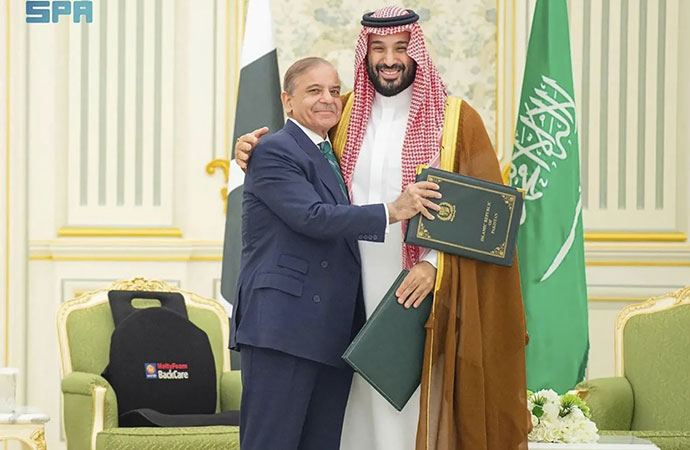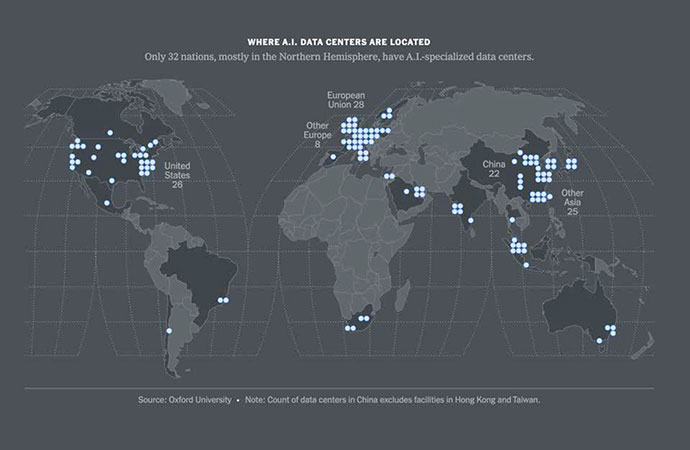Column

Pakistani Prime Minister Shehbaz Sharif, left, embracing Saudi Arabia’s Crown Prince Mohammed bin Salman after signing a joint defense pact in Riyadh, Saudi Arabia, Wednesday, Sept. 17,2025. Photo: Saudi Press Agency via AP/UNB
Oil-rich Saudi Arabia and nuclear-armed Pakistan have signed a mutual defence agreement, strengthening what was already a significant security partnership. The deal was inked in Riyadh by Saudi Arabia's Crown Prince Mohammed bin Salman and Pakistan's Prime Minister Shehbaz Sharif, with Pakistan's Field Marshal Asim Munir, considered the most powerful man in the country, also present. The moment inaugurated what could be a realignment in the Muslim world that brings together Pakistan, which boasts the largest military in the Islamic world and is also the only nuclear-armed Muslim-majority country; and Saudi Arabia, which possesses one of the most lethal forces in the Middle East. The Middle East and South Asia are converging as security domains.
The mutual defence treaty between the two powers could herald the appearance of an altered Asian order in which Sunni Pakistan's nuclear umbrella would expand to protect Sunni Saudi Arabia from nuclear-minded Shia Iran and nuclear Jewish Israel. This development comes at a time when security guarantees by America, a common strategic friend of Islamabad and Riyadh, are ringing hollow following the infructuous American strikes on Iran's nuclear facilities in June this year, and Israel's attack this month on Qatar, home to a sizeable American base in the Middle East. As the United States reassesses its global priorities in the light of its domestic compulsions, even its allies and partners - to say nothing of its opponents - will do the same.
This is where the Saudi-Pakistan treaty comes in. What is significant is that Pakistan's nuclear programme will be made available to Saudi Arabia if needed under the pact, which says that aggression against either country would be considered aggression against both. Pakistani Defence Minister Khawaja Mohammad Asif underlined the point when answering a question on whether the deterrence that Pakistan gets from nuclear weapons would be extended to Saudi Arabia. His reply: "Let me make one point clear about Pakistan's nuclear capability: that capability was established long ago when we conducted tests. Since then, we have forces trained for the battlefield. What we have, and the capabilities we possess, will be made available to [Saudi Arabia] according to this agreement." According to a Deutsche Welle report, the statement "marked the first specific acknowledgment that Islamabad had put the kingdom under its nuclear umbrella".
The quid pro quo, according to Pakistan, is that Saudi Arabia will stand by it in the event of a war between Pakistan and nuclear India, for that is what a mutual defence treaty entails. Now, India enjoys good relations with Saudi Arabia. The Indian economy benefits from Saudi oil imports and the Saudi economy gains from Indian migrant labour. But Riyadh's security choices appear to point towards Islamabad, the receiver of substantial Saudi aid and, therefore, a country on whose strategic loyalty Riyadh can depend. New Delhi's response to the Saudi-Pak deal is that it "will study the implications of this development for our national security as well as for regional and global stability". The deal is a major development that may recast India's strategic neighbourhood to its disadvantage even as its growing links with Israel improve its security. India now faces an evolving Sunni Axis.
Sunni Revival
Türkiye is an essential component of the Sunni Axis. Türkiye is the national inheritor of the great Ottoman Empire, which was also an Islamic caliphate where the Sultan claimed the title of Caliph from 1517 until the empire's abolition in 1924. Islamist President Recep Tayyip Erdo?an's neo-Ottoman aspirations, as they have been called, have led to a desire for Türkiye to be at the heart of a "Sunni Revival" to counter the Iran-centred "Shia Crescent" that has suffered reverses recently. The Shia Crescent is a two-decades-old concept that refers to alliances stretching from Mashhad in Iran to Beirut in Lebanon established on the basis of Iranian partnerships with Shia-led or Shia-influenced governments and militias across Iraq, Syria, Lebanon, Gaza and Yemen.
The fall of the Assad government in Syria in December 2024 has re-inaugurated possibilities of a Sunni Revival led by Türkiye that encompasses parts of Lebanon, Syria, Iraq and some Gulf states such as Qatar, in one analysis. Iran's ability to survive Israeli and American hostility constitutes a threat to nations that would wish to be a part of the Sunni Revival. Türkiye and Egypt, both military powerhouses in the Middle East, have a stake in resisting Iranian influence in the region, no matter how far Israel - supposedly a common enemy - expands its forward defence perimeter, with or without American support.
To put it bluntly, the Sunni Revival is about the Shia Crescent first and the Israeli-American Axis only later. Pakistan's robust military ties with Türkiye could make it a part of the Sunni Revival even as the mutual defence deal with Saudi Arabia expands Pakistan's imprint in the Middle East.
China is the great variable in all this. Whatever weakens America strengthens China (and the other way around). However, Pakistan's all-weather friendship with China has not corroded its seasonal engagements with America, which, too, are all-year-around. China would probably not be bothered all that much by the Sunni Revival and therefore would not stop Pakistan from being a part of it. So long as that revival does not turn definitively into a new bloc against the United States because of its alignment with Israel, Washington, too, will not turn hostile. Thus, this appears to be a sweet spot for Pakistan to be in, at least for the time being.
It is up to Bangladesh to decide whether and how it wishes to fit into this evolving Sunni paradigm, which is drawing South Asia and the Middle East closer as security domains. Dhaka would need to keep its relations with Washington, Beijing, New Delhi, Islamabad, Riyadh and Ankara in proportionate perspective in deciding whether and how to throw itself into the ring. International relations are centripetal and centrifugal at the same confusing time. The wisdom of the political and bureaucratic leadership decides on the best way forward.
The writer is the Principal Research Fellow of the Cosmos Foundation. He may be reached at epaaropaar@gmail.com

























Leave a Comment
Recent Posts
Religion and Politics: A Toxic ...
At Dhaka University, cafeteria workers have been told not to wear shor ...
Enayetullah Khan joins AsiaNet ...
AsiaNet’s annual board meeting and forum was held in Singapore, ...
In a New York minute
Many leaders back a UN call to address challenges to ..
Defaulted loans at Non-Bank Financial Institutions ( ..
How the late Zubeen Garg embodied cultural affinitie ..